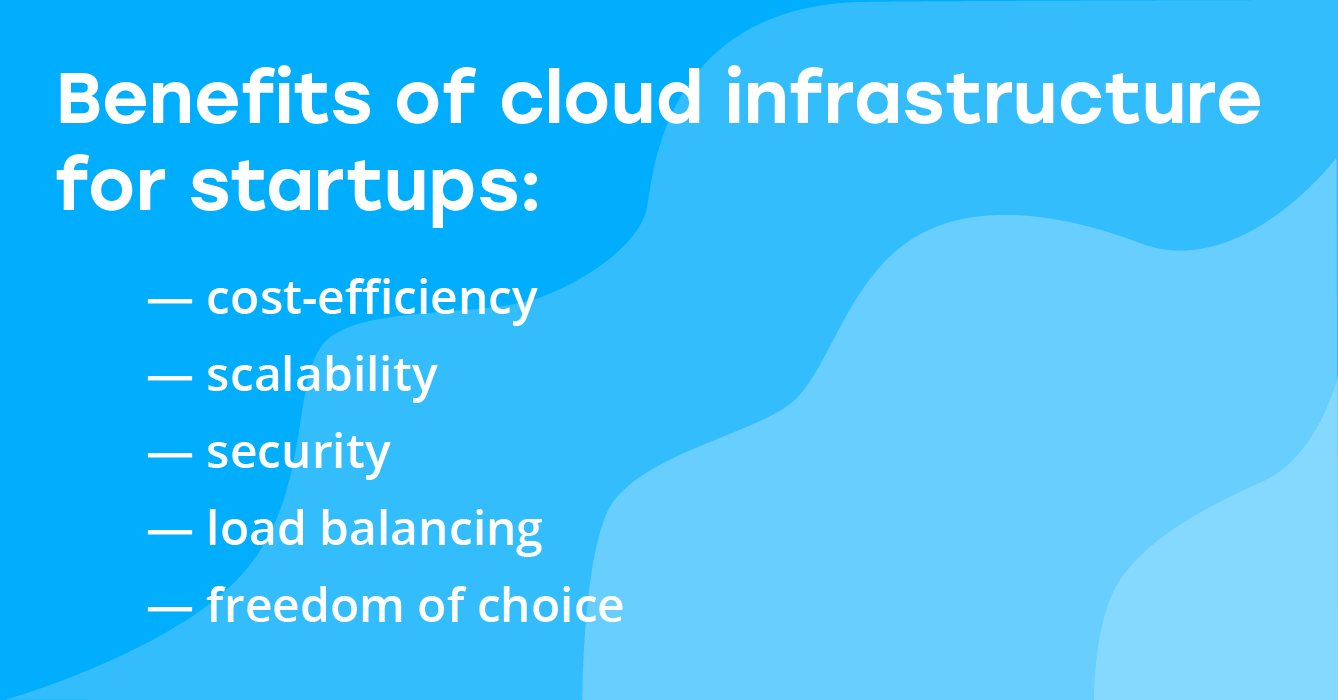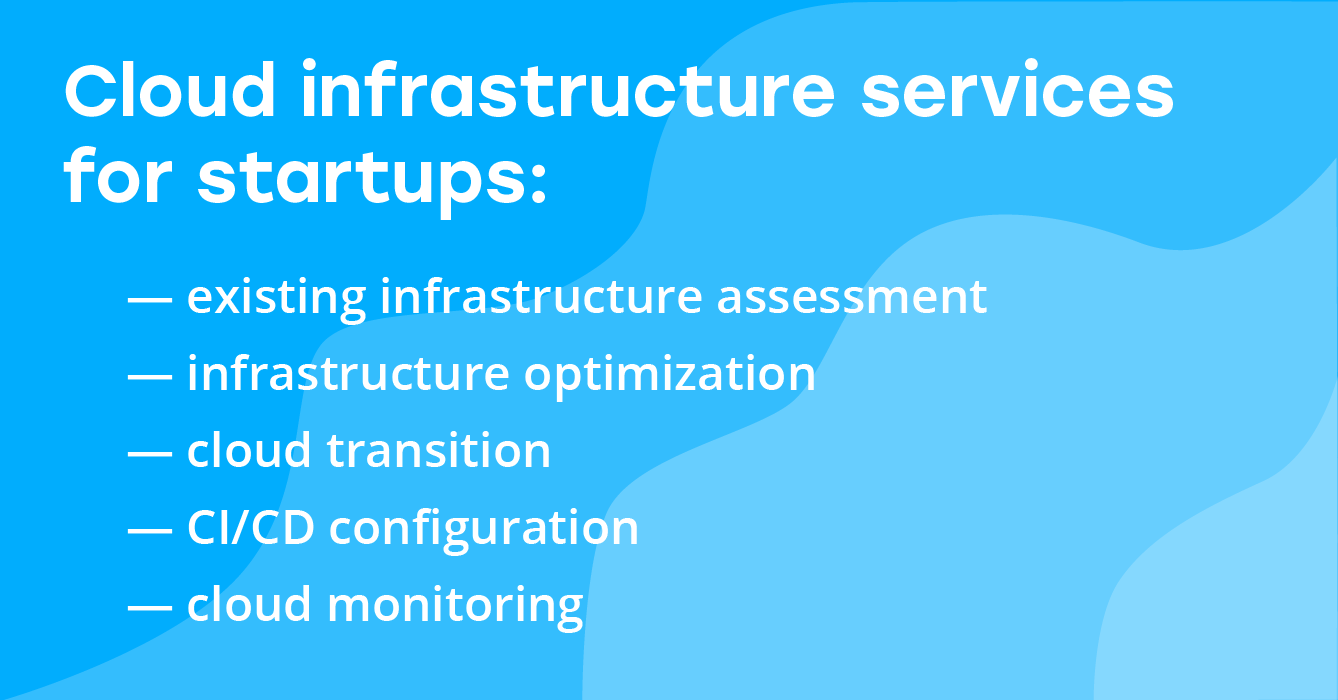Cloud computing and storage infrastructure for startups from IT Svit
If you are a startup and have not yet had your round A investment secured, you need a cost-efficient and lean IT infrastructure for your product development and IT operations.
Every startup nowadays knows that they are best off using cloud storage solutions. Amazon Web Services or Google Cloud Platform provide the full range of web services and cloud infrastructure required for software development and management in production. IT Svit has ample experience building lean and performant cloud infrastructure for startups and small businesses with AWS, GCP, DigitalOcean, OpenStack and other cloud providers.
Benefits of cloud infrastructure for startups
Why would a startup or a small business need to have a cloud-based infrastructure? For a variety of reasons:
- cost-efficiency
- scalability
- security
- load balancing
- freedom of choice
Let’s take a closer look at these cloud infrastructure benefits for startups.
Cost-efficiency
Cloud providers offer cloud computing capacities at a hugely reduced cost, as compared to renting dedicated servers at data centers or buying them to host your product development process internally. As the costs of installing and configuring the hardware in cloud data centers are spread between thousands of customers, they are literally negligible for a single startup. Thus said, you actually Pay As You Go, meaning the cloud provider bills startups and enterprises only for the resources consumed, without exorbitant CAPEX
Scalability
Due to using CDN for front-end and Kubernetes clusters with Docker containers for backend, cloud computing for startups ensures the resources at your disposal are always adequate, whether you need to grow or to reduce the scale. Auto-scaling groups make increasing or decreasing the volumes of your app instances rapid and easy to use, so the number of resources available at any given moment is adequate to the challenges you face.
Security
Cloud storage solutions provide multiple levels of security, from cloud-based bastion hosts and built-in security routines of Docker containers to DDoS-protection and cloud security features from cloud providers themselves — like Amazon CloudTrail, Google Cloud Security center, Azure Security center, etc. Working in the cloud allows codifying the security requirements and weaving them into the software delivery routines. This way the area of exposure for your business is minimal and there is no room for human error.
Load balancing
Load balancing is essential to ensure uninterrupted value delivery to your customers. Built-in mechanisms and services like Amazon LB provide stable balancing for your workloads so no traffic spikes will be threatening your cloud infrastructure. At the same time, when the workloads decrease, load balancing helps minimize the effort spent on analyzing the performance and cost-efficiency of your cloud infrastructure.
Freedom of choice
Running all web services on AWS or Google Cloud Platform might not be a perfect choice, as it implies vendor lock-in. This means moving to another cloud provider will require lots of time and effort, as you’ll need to rebuild your cloud infrastructure from scratch. However, all cloud providers offer flexible solutions so you can replace their proprietary services with open-source alternatives and have cloud-agnostic modular infrastructure that can easily perform a transition to another cloud platform.
IT Svit helps design and build cost-efficient cloud infrastructures for startups
We provide IT infrastructure design and implementation services for startups and companies of all sizes for more than 5 years. Whether you already use some cloud computing services and storage solutions, or you need to design and deploy a cost-efficient and easy to use cloud infrastructure for your company — IT Svit can help on any stage of the process.
Amazon cloud service for startups
Amazon Web Services is the most popular public cloud provider in the world. Naturally, many startups who plan to use cloud storage solutions long-term prefer to use web services from AWS. IT Svit can help your company design and implement a scalable cloud-based infrastructure that will be a reliable platform for your IT operations in the years to come.
Amazon provides the services and features for cloud storage solutions ( Amazon S3 buckets), cloud computing instances (Amazon EC2), Continuous Integration and Continuous Delivery workflows (Amazon Pipeline), distributed databases (Amazon Aurora and RDS), infrastructure for building Kubernetes clusters with Docker containers (Amazon EKS), full-scale managed Kubernetes services (Amazon Fargate), serverless computing infrastructure (Amazon Lambda), message queue handlers (Amazon SQS), and a huge variety of other products and services required to build a resilient, cost-efficient and reliable cloud infrastructure for a startup.
Google Cloud service for startups
Google Cloud Platform is another popular choice for aspiring developers and startup owners. Convenient billing model, ease of use, deep integration with Google Drive, an in-depth array of services and cloud storage solutions that serve and supplement all the needs of a software development process, managed Kubernetes to run your Docker containers — all of this is beneficial for startups.
GCP is a worthy alternative for AWS, as it provides a more flexible billing model (all in milliseconds), an all-around efficient set of cloud solutions and services like Google Big Query for Big Data Analytics, Google Kubernetes Engine for managing containerized apps, Google Cloud Storage for secure storage and management of multiple types of objects, Google Functions for serverless cloud computing options, and much, much more.
Implementation of Big Data analytics for startups
Many startups think Big Data analytics is viable for larger companies. As a matter of fact, as soon as your cloud infrastructure starts generating logs, these can be put to good use to identify possible issues, find performance bottlenecks, analyze hidden patterns in your data and provide additional profit revenues. To say more, Big Data analytics can be hugely beneficial for market analysis, cash flow predictions and even cloud infrastructure management down the track.
IT Svit provides all sorts of cloud infrastructure services for startups
IT Svit has ample experience designing, implementing and managing all kinds of cloud computing infrastructure for early-stage startups and more established enterprises alike. There are certain stages of this process:
- Existing infrastructure assessment. Many companies think that deploying to CloudFlare or Heroku can save them money. This might be right for some time but as their product development and production management workloads expand, they sometimes prove to be inadequate for the tasks and challenges your business faces. Thus said, IT Svit can assess the existing IT infrastructure and issue recommendations on how to remove the existing performance bottlenecks. We can also advise if a full-scale migration to another cloud service is necessary to future-proof your business and ensure smooth load balancing and scaling.
- Infrastructure optimization. Most frequently, the preliminary infrastructure performance and security audit can expose configuration inconsistencies, server redundancies, performance bottlenecks and other discrepancies. IT Svit then proceeds by either outlining the roadmap to the optimization of the existing infrastructure or comes up with detailed recommendations on rebuilding your software delivery and production environment systems from scratch with AWS web services or Google Cloud Platform.
- Cloud transition. Some elements of the IT infrastructure can easily be replaced with cloud-based duplicates, while some might have to be replaced with cloud-native analogs. To say more, certain elements of high-performance cloud solutions like Kubernetes or serverless computing simply don’t exist on low-cost cloud platforms or in older virtualization solutions. Therefore, a full-scale migration to AWS or GCP can be needed in order to utilize your IT infrastructure at full efficiency.
- CI/CD configuration. Working according to DevOps principles of Infrastructure as Code, Continuous Integration and Continuous Delivery greatly increases the software lifecycle predictability and transparency, helps save time, money and effort on delivering new product features and greatly simplify the app monitoring and management in production. However, implementing those principles on traditional virtual servers or at low-cost cloud computing providers requires installation and configuration of a certain CI/CD toolchain, including Terraform, Kubernetes, Jenkins, Gitlab CI and Ansible. IT Svit can provide these services and ensure a smooth and cost-efficient software delivery process.
- Cloud monitoring. Once a cloud infrastructure for a startup is deployed, it must be managed and monitored to ensure stable performance. IT Svit can configure both cloud-based monitoring solutions like AWS CloudTrail and open-source monitoring platforms like ELK stack, Prometheus+Grafanа, Sumologic, Splunk, DataDog, etc.
Conclusions on building cloud infrastructure for startups
Thus said, your startup must be lean to increase the chances of success. This not necessarily means going for web services from AWS from the start. You can start building your cloud infrastructure on any platform, as the most popular solution is not always the most feasible at the early stage of startup operations. However, your cloud infrastructure should be future-proof and built with scaling, load balancing and security in mind, or it can easily become the factor hindering your growth and success.
IT Svit can help to deploy, configure and maintain a cost-efficient, transparent and highly-performant cloud infrastructure that will ensure scalability, security, resilience, high performance and transparency of operations. Should you like us to do this for your company — let us know, we are always ready to assist!



